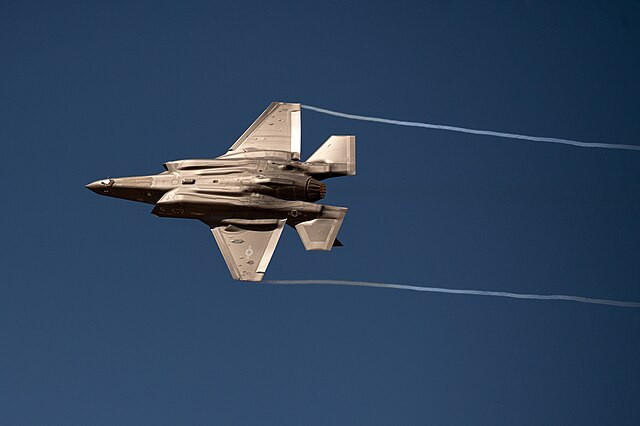The United Kingdom will acquire at least 12 U.S.-made F-35A fighter jets capable of carrying tactical nuclear weapons, Prime Minister Keir Starmer announced Wednesday at the NATO summit in The Hague. The move marks what Downing Street called "the biggest strengthening of the UK's nuclear posture in a generation" and brings Britain back into NATO's airborne nuclear mission for the first time since 1998.
"In an era of radical uncertainty we can no longer take peace for granted, which is why my government is investing in our national security," Starmer said in a statement. He described the new jets as "heralding a new era" for the Royal Air Force.
The F-35A aircraft, built by Lockheed Martin, will allow the UK to deploy U.S.-made B61 tactical nuclear bombs, a capability that was lost after Britain retired its WE177 bombs more than two decades ago. The jets will also enhance the UK's conventional strike capability, offering longer range and broader weapons compatibility than the current F-35B fleet operated by the RAF and Royal Navy.
NATO Secretary-General Mark Rutte welcomed the announcement, calling it "yet another robust British contribution to NATO." Defence Secretary John Healey said the acquisition would "strengthen the NATO-collective deterrent" and support over 20,000 domestic jobs through the supply chain, with the jets to be based at RAF Marham in Norfolk.
The F-35A purchase aligns with a broader strategic recalibration across the alliance. NATO's 32 members are expected to approve a new target to raise collective defense spending to 5% of GDP by 2035-up from the longstanding 2% benchmark. Starmer has pledged that the UK will meet the new goal, including 3.5% for core defense and 1.5% for resilience infrastructure such as cybersecurity and logistics.
"The decision follows the Strategic Defence Review," Healey said, which "confirmed we face new nuclear risks, with other states increasing, modernising and diversifying their nuclear arsenals."
Seven NATO members, including the U.S., Germany, and Italy, already host dual-capable aircraft equipped with B61 bombs. Under NATO protocols, the deployment of such weapons requires joint authorization by the U.S. president and the UK prime minister through the alliance's nuclear planning group.
During a parliamentary session, Conservative MP Lincoln Jopp questioned whether a dual-key arrangement would be in place. Border Security Minister Dame Angela Eagle responded, "The UK will also always retain the right to participate, or not to participate, on the basis of that governance arrangement."
Analysts note that integrating the F-35A into the UK arsenal may face operational and political hurdles. Justin Bronk of the Royal United Services Institute said, It will take time for the RAF "to get back in the nuclear game," but emphasized that the aircraft's extended range and payload are valuable strategic assets.
The renewed investment in nuclear-capable air power follows sustained pressure from Washington. President Donald Trump has repeatedly criticized European allies for failing to shoulder more of NATO's financial and military burden, prompting several members-including Germany-to announce major increases in defense outlays. German Chancellor Friedrich Merz said Tuesday that Berlin would build "Europe's strongest conventional army."
The UK's Trident-armed Vanguard-class submarines remain the nation's only current nuclear delivery system. While Trident missiles are American-made, the warheads are developed and maintained in the UK, allowing London to maintain what successive governments have called an "independent deterrent."






